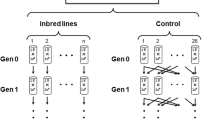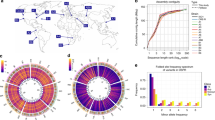Abstract
SEVERAL authors have reported the recovery of variant types by inbreeding Drosophila melanogaster caught in the wild. The mutations described have generally been of single major genes, recognized either by their obvious morphological or lethal effects; inverted sections of the chromosomes have also been found. The literature of the subject has been reviewed by Dobzhansky1.
This is a preview of subscription content, access via your institution
Access options
Subscribe to this journal
Receive 51 print issues and online access
$199.00 per year
only $3.90 per issue
Buy this article
- Purchase on Springer Link
- Instant access to full article PDF
Prices may be subject to local taxes which are calculated during checkout
Similar content being viewed by others
References
Dobzhansky, Th., Biol. Rev., 14, 339 (1939).
Mather, K., J. Genet., 41, 59 (1941).
Dubinin, N.P., and collaborators, Biol. Zhurn., 3, 166 (1934).
Author information
Authors and Affiliations
Rights and permissions
About this article
Cite this article
WIGAN, L. Polygenic Variability in Wild Drosophila melanogaster. Nature 148, 373–374 (1941). https://doi.org/10.1038/148373b0
Issue Date:
DOI: https://doi.org/10.1038/148373b0
This article is cited by
-
Polygenic variability in chromosomes of Drosophila melanogaster obtained from the wild
Heredity (1950)
-
Recent studies on inheritance of quantitative characters in plants
The Botanical Review (1944)
-
Viability interactions between chromosomes ofDrosophila melanogaster andDrosophila simulans
Journal of Genetics (1943)
-
The balance of polygenic combinations
Journal of Genetics (1942)
Comments
By submitting a comment you agree to abide by our Terms and Community Guidelines. If you find something abusive or that does not comply with our terms or guidelines please flag it as inappropriate.



